The Nuclear Decommissioning Authority (NDA), the government organisation responsible for cleaning up the legacy from the UK’s early nuclear industry, held an event for Scottish Parliamentarians, stakeholders and representatives of Scottish communities to explain the environmental and economic benefits of the UK’s nuclear decommissioning programme.
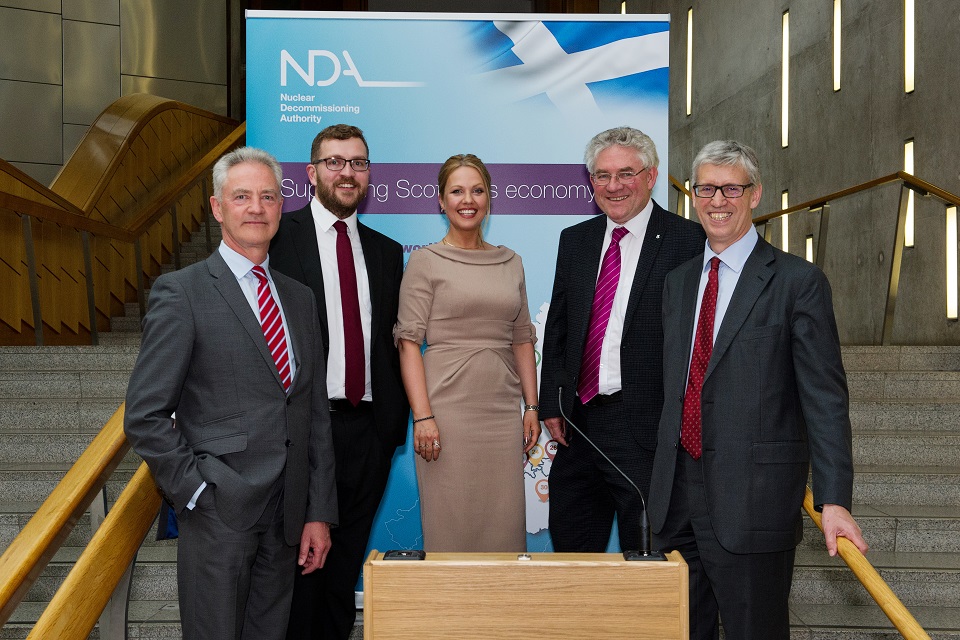
The NDA’s CEO, David Peattie, said:
The NDA’s 3 sites in Scotland have been at the leading edge of the UK’s nuclear industry for several decades, from Scotland’s first nuclear power station at Chapelcross, to the ground-breaking research at Dounreay and pioneering approaches to decommissioning and hazard reduction at Hunterston.
I am delighted to have had the opportunity to speak with such a diverse group of interested people about the NDA’s mission and the progress we’re making, but also about what we’re doing to leave a positive lasting legacy and support economic development, in partnership with the regeneration agencies, suppliers and local communities where we work.
The NDA’s nuclear decommissioning programme is worth £280 million a year in Scotland, with over £22 million going to 250 contracts with Small and Medium-sized (SMEs) companies based in every region of Scotland. 58 of the 73 Scottish parliamentary constituencies are home to SMEs providing goods and services to support nuclear decommissioning across the whole of the UK.
An important part of the NDA’s work involves mitigating the impact of its decommissioning programme on these communities, working with partner organisations to encourage economic sustainability after the sites finally close. Since 2006, a total of £15 million of funding from the NDA has gone to support economic development initiatives in Scotland, and this has unlocked a further £50million of matched funding.
NDA regeneration activities (since 2011) include:
- £21 million for the UK’s Nuclear Archive in Wick
- £2 million investment in Scrabster Harbour
- £1.7 million for regeneration initiatives close to Chapelcross, Dumfries and Galloway
- £250,000 for North Ayrshire Youth Employment Scheme
- £300,000 to re-open a marine research centre on the island of Cumbrae, near Hunterston
Nuclear clean-up in Scotland
Almost 2,500 people working on NDA’s 3 Scottish sites.
Dounreay
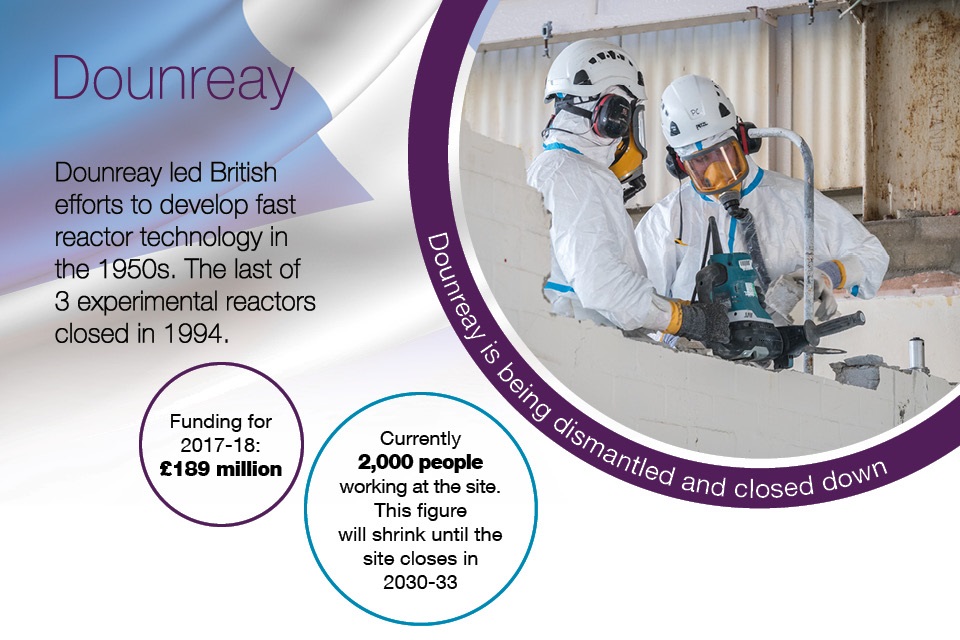
Dounreay led British efforts to develop fast reactor technology in the 1950s. The last of 3 experimental reactors
closed in 1994.
Dounreay is currently being dismantled and closed down.
Currently 2,000 people work at the site. This figure will shrink until the site closes in 2030-33.
Funding for 2017 to 2018: £189 million
Making the site safer by:
- removal and destruction of hazardous metal coolant from 2 reactors
- removing fuel elements that have been jammed for many years
- completing preparations to demolish the oldest reactor on site
- construction of underground vaults to dispose of Low Level Waste, in line with Scottish Government radioactive waste policy
- treatment, packaging and immobilisation of hazardous liquid waste that has been stored for 20 years
Chapelcross
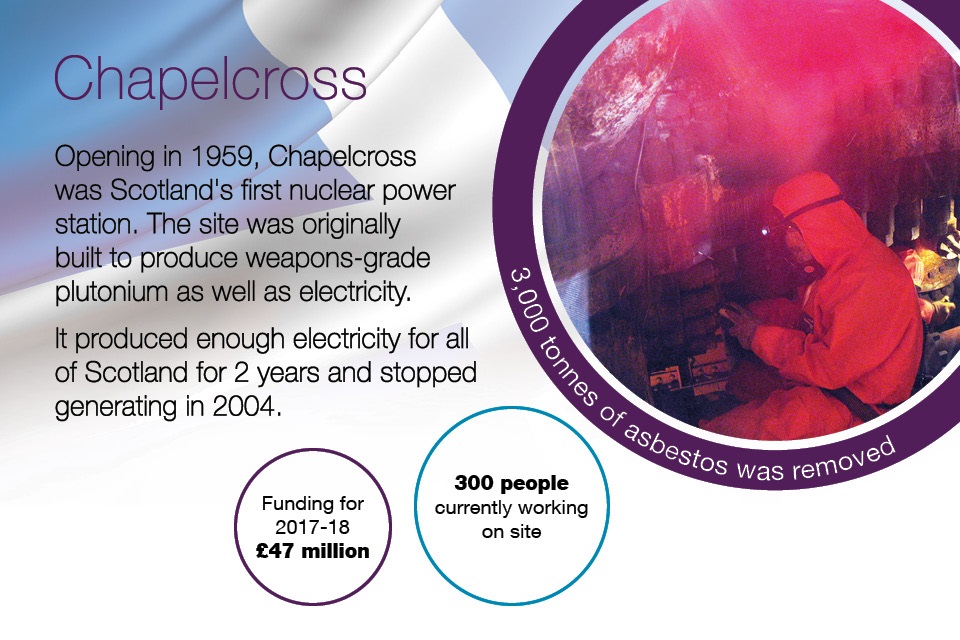
Opening in 1959, Chapelcross was Scotland’s first nuclear power station. The site was originally built to produce
weapons-grade plutonium as well as electricity.
It produced enough electricity for all of Scotland for 2 years and stopped generating in 2004.
Around 300 people work at the site.
Funding for 2017 to 2018: £47 million
Making the site safer by:
- removal of 3,000 tonnes of asbestos
- spent fuel pond Number 1 emptied of radioactive waste, and drained
- installation of equipment to process waste from pond Number 2
- constructing a new storage facility for Intermediate Level Waste in line with Scottish Government policy for radioactive waste
- structural steelwork and ducting removed from the 16 boilers
- site closure in 2026
Hunterston A
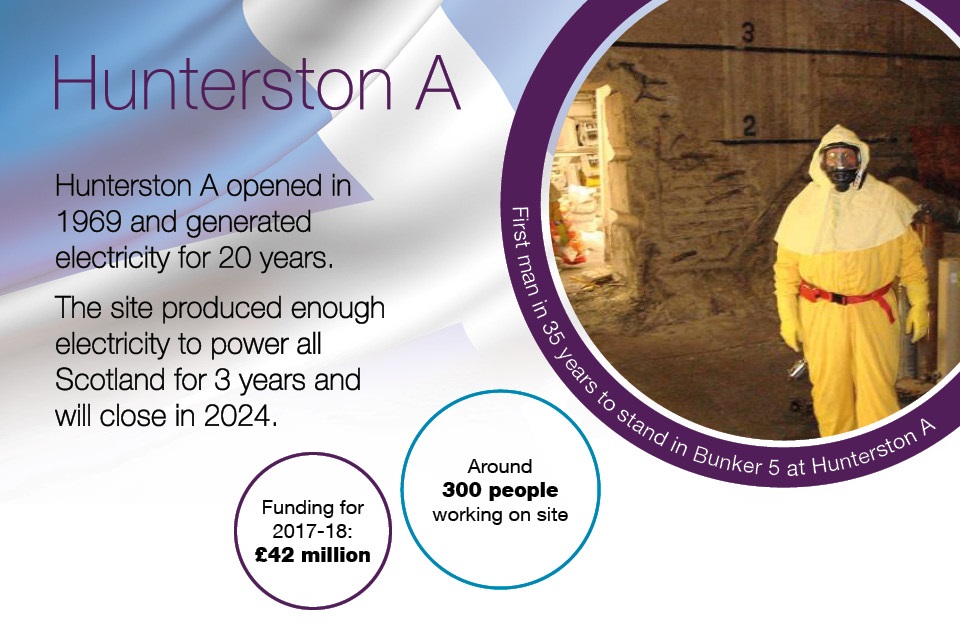
Hunterston A opened in 1969 and generated electricity for 20 years.
The site produced enough electricity to power all Scotland for 3 years and will close in 2024.
Around 300 people work at the site.
Funding for 2017 to 2018: £42 million.
Making the site safer by:
- installing aluminium cladding to weather-proof reactor buildings
- spent fuel storage ponds emptied, drained and cleaned out
- construction of shielded store for higher-activity waste
- deploying robotic equipment to retrieve radioactive waste from 5 bunkers
Leaving a positive legacy
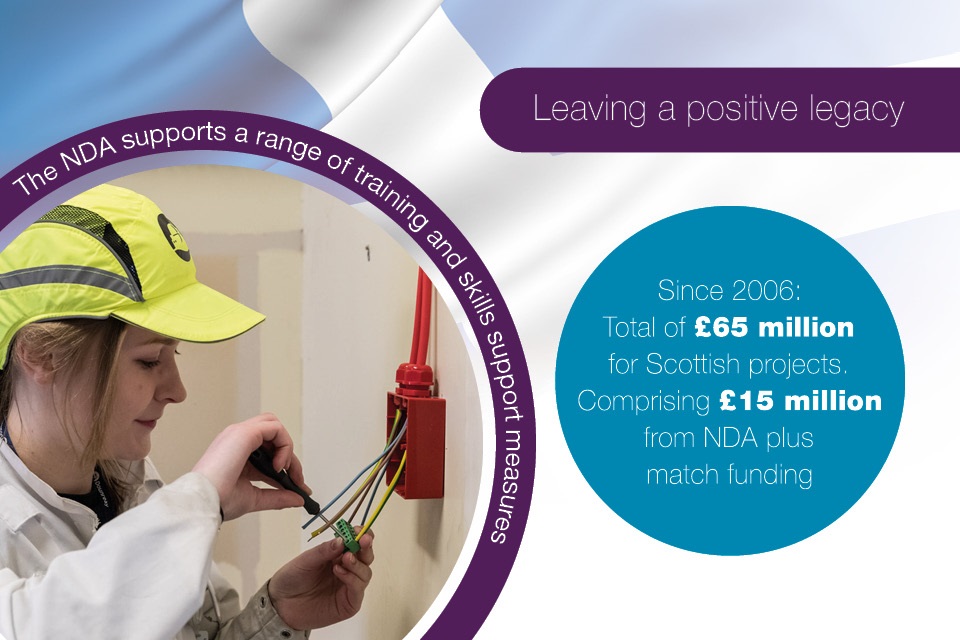
The NDA is working with local communities to deal with the economic impact of closing sites.
Support is provided in partnership with local authorities and economic development bodies, with priorities focused on:
- economic development initiatives
- help for start-ups and business diversification
- skills development and training
Since 2006: total of £65 million for Scottish projects. Comprising £15 million from NDA plus match funding.
Economic development examples
- £2 million initial investment in Scrabster Harbour’s £20 million redevelopment programme:
- underpins its fishing and tourism industries
- enables the area to capitalise on the growing offshore renewables sector as well as oil and gas developments
- £250,000 for North Ayrshire Youth Employment Scheme, aimed at tackling high unemployment rates among young people.
- More than £14 million to a range of Caithness projects supporting economic diversification, employment initiatives, education and skills, social infrastructure and tourism.
- £21 million nuclear archive for records from the entire UK nuclear industry. Located in Wick as part of the NDA’s commitment to help offset the economic impact of closing Dounreay.
- £1.7 million for programmes at Chapelcross, working with Dumfries and Galloway Council, and Scottish Enterprise, to support local economic activities. Now focused on marketing land next to the site for industrial use, including renewables.
- £300,000 to help re-open the UK’s oldest marine research centre on the island of Cumbrae, near Hunterston, which closed due to loss of grant funding.
Our Supply Chain

During 2016-17, 250 SMEs in Scotland were providing goods and services directly to the NDA’s English, Scottish and Welsh sites. The value of these contracts is around £22 million.
The NDA, through its businesses, Dounreay Site Restoration Ltd and Magnox Ltd, placed contracts with SMEs in every Scottish parliamentary region and in 58 of the 73 Scottish parliamentary constituencies.
Almost half of SMEs working for Dounreay are from the Caithness, Sutherland and Ross constituency, which represents the highest ‘buy local’ concentration of all NDA sites.
Follow this news feed: DEFRA





